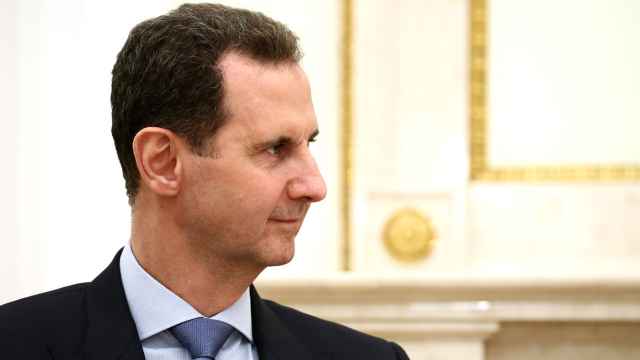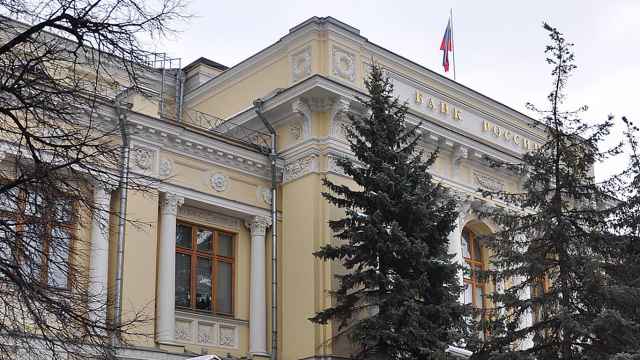When Russia opens a "billion-dollar bridge" on its Pacific coast this summer, President Vladimir Putin can expect enthusiasm among the 5,000 islanders it will connect to the mainland.
But Putin will also be looking for attention from a country miles away. China has emerged as a trading and diplomatic partner but also as a potential rival for control of Siberia's resources.
That has brought a new focus in Moscow on both business and military investment in the Far East.
Putin visited China earlier this month. He met Chinese President Hu Jintao and attended a summit of the Shanghai Cooperation Organization, which also includes former Soviet states in Central Asia.
Putin has poured money into the Vladivostok area since it was chosen five years ago to host this year's Asia-Pacific APEC summit.
The bridge is a sweeping statement of intent. With a central span of 1,100 meters, it can claim to be the longest of its type in the world,
It connects Russia's main Pacific port to Russky Island, where just 20 years ago, as Soviet communism collapsed, soldiers starved to death for want of rations being dispatched to this remotest of outposts.
Today, though some question the efficacy of bureaucrats pouring taxpayers' rubles into the region, it shows a will in the Kremlin to engage in the east, where Putin must balance the opportunities and risks presented by the rapid growth of China.
"If Peter the Great were alive today, he would relocate the capital to Vladivostok, not St Petersburg," said Dmitry Trenin, director of the Carnegie Moscow Center. "The Pacific is the equivalent of the Baltic Sea in the 18th century. It's where the action is. But Russia needs to divert far more attention to the Far East than it has been devoting recently. … It will remain a challenge."
Among the talks between Russia, the world's biggest energy producer, and China, the largest consumer of energy, was a natural gas deal that Moscow hopes to finalize after years of negotiation.
Other deals that came out of Putin's visit include a multibillion-dollar joint venture to build a long-haul airplane, and a state-run fund to invest in Russian and Chinese projects.
Russian trade with China has risen at least 40 percent year on year for the past two years, and Russian officials say that a target to have $100 billion in bilateral trade by 2015 is likely to be reached ahead of time.
China's widening sphere of economic influence is already felt on a local level in Russia, especially in areas close to the border.
Chinese-made goods stock the shelves at grocery stores, and Russians make shopping trips to China for clothes and consumer goods.
The worry in Moscow, which forged an imperial dominion over sparsely populated Siberia in the 19th century, is that China's influence is now challenging Russian hegemony in its own lands.
"[Russia has] a neighbor that is becoming more and more powerful economically, and its eastern territory is becoming increasingly focused on that powerhouse nextdoor," Trenin said. "Literally, they are becoming an appendage to China's growing industry."
In an attempt to parry China's growing influence, Moscow has tried to boost its political presence in the region. The new government includes a Far East development minister, a newly created position.
A state company is also being created with the purpose of exploiting the resources of Russia's Far East. But some analysts say that the bureaucratic, state-led approach to Russian-Chinese relations may indicate lack of a more nuanced plan.
"Putin understands the importance of dealing with China. Hence the formation of the new ministry," said Pavel Bayev, an analyst at the Peace Research Institute Oslo. "But he has no clue about how to deal with it."
In an attempt to beef up Russia's presence on its border with China, Moscow has reinforced the dwindling local population with migrants from across the former Soviet Union. They are given money and jobs in return for settling in the remote areas.
The government program has already transported 400 Russian-speaking families from other countries to the Far East.
Other programs, some of them more colorful than of obvious strategic significance, are aimed at strengthening Russia's borders.
Local media outlets have reported that the next school year will include the training of the region's first corps of Cossacks, the informal frontier force used by the tsars to repel enemies and whose name has been revived amid a general nostalgia for the imperial past under Putin's 12-year dominance.
Both Hu and Premier Wen Jiabao are expected to step down at the end of this year, but Putin has succeeded in cultivating a relationship with Vice Premier Li Keqiang, Wen's likely successor.
The two had a chance to talk earlier this year when Li quietly visited Moscow while the premier was on a much-publicized trip through Europe.
One of the central themes of the Russian-Chinese relationship is the violence in Syria and the future of President Bashar Assad.
Russia and China, both permanent members of the UN Security Council, have stymied efforts by Western powers to condemn or call for the removal of the Syrian leader in formal resolutions.
The Security Council voting reveals an often-repeated pattern in which China follows Russia's more vocal lead on issues from Syria to Iran, allowing Russia to take the lead and shielding China from international scrutiny.
"China and Russia have an informal agreement over how to vote in the UN Security Council," said Fyodor Lukyanov, editor of Russia in Global Affairs. "China basically follows the Russian vote when it comes to issues where China is not vitally interested. But China will expect Russia to take its side when Beijing wants it."
Russian officials emphasize that their position on Syria reflects shared interests in maintaining centers of power outside Washington and Brussels as well as a policy of noninterventionism, code for limiting Western influence in regions where either of the two countries has interests.
Russia and China have voiced opposition to new sanctions against Iran.
Critics see Putin and the Chinese leadership as interested mainly in discouraging demands for democracy.
While the two countries agree on a common front to defend common interests globally, their relationship is thornier closer to home.
"Russia can talk about a strategic partnership with China, but they will never be actual allies because China is too much of a potential threat to Russia," a Western diplomat said. "Russia cannot avoid being concerned about China."
Moscow has been bolstering its military presence in the Far East and around China and plans to move the first of its newest class of submarines to the Pacific Fleet at Vladivostok.
A Message from The Moscow Times:
Dear readers,
We are facing unprecedented challenges. Russia's Prosecutor General's Office has designated The Moscow Times as an "undesirable" organization, criminalizing our work and putting our staff at risk of prosecution. This follows our earlier unjust labeling as a "foreign agent."
These actions are direct attempts to silence independent journalism in Russia. The authorities claim our work "discredits the decisions of the Russian leadership." We see things differently: we strive to provide accurate, unbiased reporting on Russia.
We, the journalists of The Moscow Times, refuse to be silenced. But to continue our work, we need your help.
Your support, no matter how small, makes a world of difference. If you can, please support us monthly starting from just $2. It's quick to set up, and every contribution makes a significant impact.
By supporting The Moscow Times, you're defending open, independent journalism in the face of repression. Thank you for standing with us.
Remind me later.






